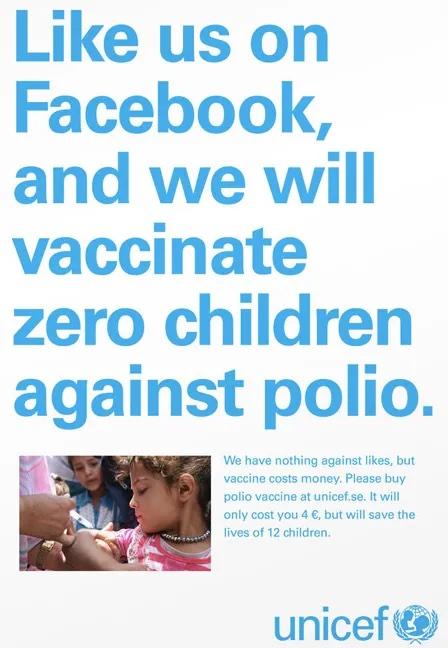
The “Likes Don’t Save Lives” campaign by UNICEF was launched to raise awareness of “slacktivism,” where people post about real-world problems without taking further action. The campaign’s primary message is that while social media engagement can raise awareness, it does not directly contribute to the financial donations needed to solve critical issues like hunger, poverty, and disease.
UNICEF’s campaign raises a crucial question: Does marketing always have to feel good? Sometimes, the best approach is to be brutally honest. Here’s what marketers can learn.
Watch The Ad
The “Likes Don’t Save Lives” campaign was executed across various UNICEF branches worldwide. One of the most impactful ads features two young boys living in poverty, a stark representation of the real-world issues the campaign aims to address.
The ad begins within a run-down building. Inside are two boys, one standing and facing the camera and the other seated on a thin mattress. Clothes hang from a line, and a tattered sheet blows in the window. The room is bare and damaged.
As the camera moves close to the standing boy, He begins to speak:
“My name is Rahim. I’m ten years old. I live here with my younger brother.
Sometimes, I worry that I will get sick. Like mom got sick.
Who will look after my brother?
But I think everything will be alright.
Today UNICEF Sweden has 177,000 likes on Facebook.
Maybe they will reach 200,000 by summer.
Then we should be alright.”
The camera then pans to the seated boy, and superimposed on the screen are two sentences:
“Likes don’t save lives. Money does.”
It ends with a disclaimer on the cost of vaccinating children against polio.
Confronting “Slacktivism”

The ad at right hammers home the point: social media engagement isn’t going to help UNICEF with its work.
UNICEF is taking on “slacktivism,” or the use of social media as a form of activism. As the name suggests, posting about problems on social media takes very little effort – and while it can raise awareness, it does not help like donations of time and money.
The strategy is counter to most advertising campaigns, in that it does not promise to make you feel good about yourself: in fact, it criticizes those who are posting about UNICEF! The campaign works by:
- Highlighting Real-Life Consequences: By highlighting the plight of these children (as a stand-in for children like them all over the world), UNICEF juxtaposes the ineffectiveness of social media against the stark need for funding. This is a powerful emotional call to action.
- Bluntness: “Likes don’t save lives.” It’s as blunt a slogan as you’ll find in advertising. Yet it makes the stakes real: UNICEF is not in a popularity contest, it’s in the business of saving lives.
- Guilt and Responsibility: Guilt is a heavy spice in any story, much less a major ad campaign. It’s a risk, but it works because it is so powerful. If you see this campaign and feel a tug of guilt, you’re probably more likely to donate.
Other Brutally Honest Campaigns
UNICEF isn’t the only brand that’s tried brutal honesty:
- Carrefour: This French grocery store re-dubbed itself as the “Black Supermarket” when EU laws dictated that they couldn’t sell produce grown from local seed strains. Their ad specifically called out the law and the organization’s responsibility to defy it, turning their efforts into a brand awareness effort.
- Burger King: It’s no secret that fast food chains use extensive preparation to make food appear delicious in advertisements. However, to highlight their natural food and ingredients, Burger King showed a time-lapse of their famous Whopper as it aged and molded over time. While it may seem like a terrible idea to show your product decaying, BK saw it as an opportunity to demonstrate the quality of their food.
These examples all seem counterintuitive to value-based, positive-association marketing. But all the components of good communication are here: a clear appeal to pathos, a simple and direct message, and a remarkable call to action. They work.
Marketer’s Takeaway
Most of the time, brutal honesty isn’t appropriate. Using negative emotional identification risks associating a brand with that negative emotion, and few of us want to produce marketing that sounds like a drag or a guilt trip.
But sometimes it works.
The gravity of UNICEF’s mission adds to the power of this message: they are in the business of saving lives. Providing food and vaccines to children in poor areas is changing a young person’s life for the better. That takes financial resources, not just retweets.
So, when UNICEF calls out their audience for slacktivism, the message carries a weight that cannot be ignored. In turn, the bluntness of the message calls us to act.
With that in mind, we can take away a few key ideas:
- Consider the Context of Your Brand: If you’re in the nonprofit arena, brutal honesty might be more appropriate than, say, a B2B tech company.
- Ask Tough Questions: Avoid guilt as an emotional trigger, but don’t hesitate to call out gaps or bad practices that customers might solve with your product.
- Don’t Hedge on CTAs: Some marketers will provide gentle CTAs to ease their customers into a sales funnel. But, to some, the marketing funnel is dying, which means making sure you grab a customer with a strong emotional appeal.
We’ll be brutally honest: you’re wasting money on your current agency. Our AI marketing assistants can help you create great sales and marketing materials for a fraction of the cost. Try the Media Shower platform with a free trial.
